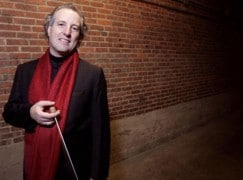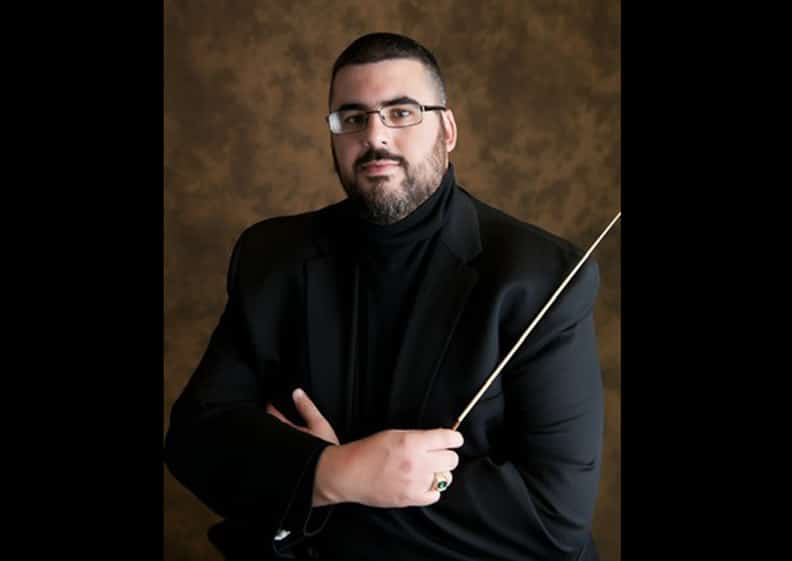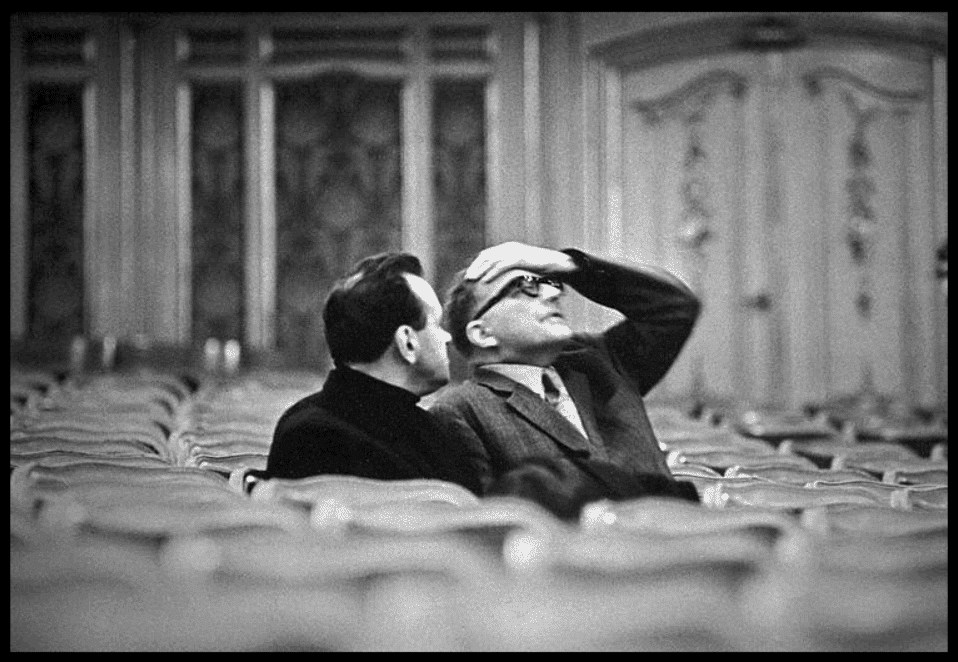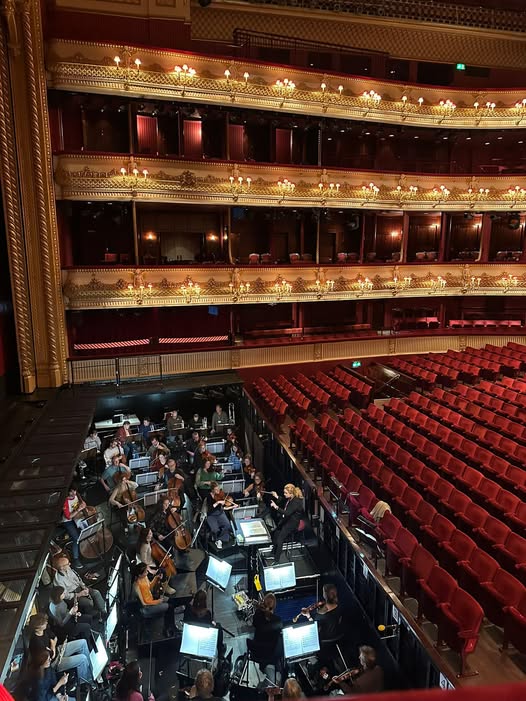Manfred Honeck: Let people come in jeans. Just let them come…
mainThe Pittsburgh music director has been talking to his hometown paper, Vienna’s Kurier, about making ends meet and filling the house in a city that is drifting away from European culture.
He gets his musicians to introduce each concert on video and is encouraging young people to attend his concerts dressed in jeans.
Read here.






So, can anyone tell me, please: where are these places, in the year 2016, where people DON’T attend classical concerts in jeans?
Exactly! I wonder perhaps in the more conservative parts of Europe – Salzburg and Munich? In London you can dress casual, a fact which our ignorant media still fails to grasp.
In the Gasteig in Munich, where most of the philharmonic concerts take place, many people are dressed casual as in other places in Europe, no difference to other places. In the Bavarian Staatsoper people tend to be dressed more formal than e. g. in Cologne or Berlin but people in jeans are also welcomed (in lesser extend some come quite casual, indeed).
But a young lady in bathing suit who appeard at Rheingold in 2007 in Munich was forcebly removed from the auditorium, under the attentive gaze of the male part of the audience.
Possibly some kind of attempt to dress as a Rhinemaiden? I did see a guy in a Davy Crockett outfit (complete with raccoon hat) at Fanciulla Del West at the Met…………..
Well, there are jeans and then there are jeans. Smart jeans (Versace makes jeans!!) and other more dressy accompaniments are not ‘jeans’ per se, IMO.
But in Vienna – especially at the major venues like Musikverein – people most definitely do dress well. Just check out any link on U-tube. I’ve been there at least 15 times and it’s always the same; if people turn up under-dressed (not to be confused with my earlier comments on jeans) then they most definitely get death stares from the other patrons!! I’ve worn jeans, boots and a nice jacket and scarf and nobody has taken any notice of me. (When you’re travelling sometimes these are the only clothes available to wear to such places. The worst experience with non-conformity I’ve ever had was at the Leipzig Gewandhaus last year; I was tapping my foot quietly to some wonderful part of a symphony and the woman next door gave me the biggest silent ‘bitch slapping’ it was possible to get. And I’m a very seasoned concert-goer.)
For the upcoming opening concert of the September Festival in Prague, which is the Dresdeners and Thielemann playing one of the programmes that will be presented at the Proms a few days later, the Website states that Black Tie is obligatory. I telephoned the box office to ask what would happen if we turned up in jeans ect, I was told that we would not be allowed to enter. The lady at the box office said that at the very least, a dark suit and tie would “probably” be acceptable. Suffice to say, I did not book tickets.
I hope they play to a half-empty house. Somebody’s priorities there are all wrong. Given the number of men I know who own black tie, or women with the sort of evening gown that usually accompanies a creature so dressed, I doubt a compulsory black tie rule could be accommodated in most cities of Canada. And the attitude demanding it would put off a very great number of people.
I do regret, sometimes, the decline of occasions for which one “dresses up” — I see people go into a fine dining restaurant dressed in ways that only a few years ago would have been unthnkable. And a few years ago at a Gala, I sat a few rows from a group of young people dressed as if they had just come in from a labouring job — I rather think they had. And that was an event when lot of people were in black ties and evening dresses. The music probably sounded the same to all of us.
The way we present ourselves to the world, in terms of clothing, conveys messages. ‘Dressing-up’ for an occasion is an expression of respect, and coming in your best clothes to a concert underlines the distance between the occasion and the trivialities of every-day life. Insistence on dress code for classical concerts should be encouraged, not criticized. What is the point of attracting audiences who have no idea about what is presented to them?
There is a difference between lowering the treshold and keeping the doors open.
Better is: less concerts, less money, greater performance quality, more attentive audiences…. in short: music life not as a business but as an art form, by and for people who have some understanding of what they are doing.
Dressing up voluntarily can mean many things, of which respect, perceived social class, confidence, etc. can be part. Mandatory dressing-up, on the other hand, carries implications of social exclusion and snobbery (ie. this is an occasion for people who routinely wear black tie – if you’re not one who goes to ‘black tie’ events, you’re not welcome). In this case, this is clearly a gala meant at the rich. Middle class not welcome.
You don’t have to be richt to sport black tie.
Eric Satie lived as a tramp in his house in Arcueil but was impeccably dressed as a traditional French gentleman every time he welft the house and migled with the Parisian artistic and high upper classes.
Erik Satie died in 1925.
Perhaps, for most, times have changed?
Mandatory dressing up for concerts is lunacy!
I exaggerated a bit for effect, to make a point…. but indeed it should not be conditional. That audiences are coming at all is the main thing.
But the moment I see an imitation tramp laying his dirty boots on the chair in front of him, I would prefer him to be given a better outfit at the entrance, or a burka.
Sometimes, by way of experimental exception, a concert hall is furnitured not with chairs but with mattrasses, and concert posters are then decorated with encouragements to appear in jeans and T-shirts and feel free to slumber through the music. It has not resulted in a sudden increase of more casually-wired audiences, but for a Morton Feldman concert, jeans, T-shirts and matrasses would be ideal.
A classical concert will have a better general atmosphere if the visuals, both on stage and in the auditorium, have something special and festive about it – except if you play Mahler IX of course, or Shostakovich. Maybe dress codes have to be developed according to the type of programme? Dark suits and dresses for Shos and Thaik, hawai shirts for Debussy, Ravel and Messiaen, grey plain factory clothes for Boulez, casual and loose hairdo’s for Beethoven, velvet vests for Chopin recitals?
I love dressing up when I go to the concerts, the ballet, a nice restaurant, etc. But I can. I also loved seeing the students come in, fresh from class in some cases, still in the casual uniforms of youth — they may or may not have had better togs at home, but the main thing was they were there because of the love of the art form. I agree to a good extent about respect, but they showed theirs by spending some of their far from abundant resources on (granted discounted) tickets and in their attention to the programme. They were the kind of people who would be back in suits and even black tie in later life.
Talking of fewer concerts, and not running them as a business, has a very elitist ring to it. Who is going to support the players of these few events and their families? In what universe do you fancy that they will be supported by a few artistic appearances a year? Grow up and get out into the real world. And listen to Manfred Honeck. He understands what matters — not isolation for the well-dressed few. I find your suggestions not merely elitist but, on reflection, offensive.
“Grow up and get out into the real world.” It is exactly the ‘real world’ which is supposed to be left behind the moment we enter a concert hall. Quality awareness has nothing to do with offensive elitism, but with accessible elitism – I am for elitism for everybody: do your best, make an effort, come to the hall and enjoy some great music making by people who give their best – also a form of elitism, after all.
The performance culture has grown into a veritable business with lots of money going around. It will shrink back to a more realistic size, no doubt. In such a process it seems best to protect the innate qualities of the art form and a smaller scale will make it less expensive as well. I think THAT shows something of the ‘real world’.
I’ve never understood why dressing up for a concert is important, either as an audience member or a performer (I mean, being onstage & wanting my audience to be dressed up). It has always seemed to me that the well-dressed people want everyone to dress up as a tribute to THEM, not to the art form.
And anyway, a person can be just as ignorant in a tuxedo as in jeans & a sweater.
Ignorance is free for all and available everywhere…. there is no point to make here.
And in a social gathering where the consensus has been to dress-up, out of respect for the occasion, people who don’t give a damn and still do appear, are impolite and stick-up their middle finger to the gathering. That does not seem to be a very civilized and meaningful attitude, in fact it is an expression of populism and a juvenile-bourgeois mind-set thoroughly conventionzlied since the jolly sixties: ‘épater les bourgeois’, i.e. their parents who paid for their education.
For obvious students it is a matter altogether different.
I agree with your comments about dressing for concerts! I wonder why there’s such a significant degree of overt defensiveness from people over this matter. (I wonder if I wonder.)
In practice, the dress code at the Czech Philharmonic is generally suit-and-tie, though you’ll often see people – mostly tourists, I suspect – dressed more casually. Back in 1999 I visited Prague and the orchestra’s website said “Please respect the tradition of formal dress at concerts,” or something to that effect. Generally I have no problem with people wearing jeans to concerts, but I must say I rather like this practice in Prague.
Opera North’s FAQs always makes me chuckle. It tries to be helpful and still creates confusion as it tries to bust myths.
“4. You have to get dressed up!
Some people enjoy dressing up as part of the ‘Opera Experience’ but it’s not all top hats and tails! When you go to a performance you can wear whatever you feel comfortable in and would usually wear to a theatre or the cinema.”
Um… actually it’s never “top hat and tails”. Why even mention it?
I’d love Glyndebourne to introduce a casual dress day. I suspect it would be quite popular.
If Glyndebourne could only enter the 21st century and in the name of diversity introduce an occasion for white tie and tails that would be a real start – as it would acknowledge that there were ladies present.
As ALL readers of SD surely know, gentlemen never wear ‘black tie’ (short coats) when dining in female company.
I mean, people, isn’t this obvious?! Have some respect.
Here on the estate we ALWAYS lunch and dine in white tie and long dresses, every day, every season, with candle light and a string quartet in the corner, and also on those unfortunate occasions when the cook has indulged in a culinary déraillement. Mr B just wants it so and although ti gives us an immense load of work, and although we don’t enjoy it ourselves since we have to eat downstairs, we have the feeling it gives some air of distinction to the place, in spite of the awful dissonances we occasionally hear drifting down from the studio.
Sally
A gentleman but never dresses in white tie until after 8pm. Also, It is discouraged to wear black tie before 5pm.
In the good old days at Boston Symphony Hall, for the Friday afternoon subscription concerts, the male musicians wore short black jackets with stripped trousers, white shirt and either a dark bow tie or a long neck tie.
I think stripped trousers would look quite odd with all the other garments seemingly in good condition. A local Bostonian tradition?
Here white tie and long dress at breakfast, lunch and dinner is indeed extreme, but that is the tradition of the house which goes back to the Earl of Kennethmoure (18C) who thus rebelled to Queen Anne’s foreign policy. Mr B is, to our regret I must say, always cultivating traditions.
Sally
Look at the VPO on New Year’s Day: stripey trousers, short dark coats/jackets, white shirts, proper (greyish) ties. Think a formal English wedding, just minus the tailcoats. Comfortable but definitely formal.
Again, no tailcoats because traditionally no women.
Note, please, no bow ties (totally inappropriate as this is not evening dress of either kind), and NO CRAVATS!!!
It is only North Americans who insists on wearing ‘tuxedos’ as they call them as ‘day wear’. And I can’t think why…
Even snooker players until 20 years ago wore ‘lounge’ suits with weskits rather than evening wear (as now) during the hours of daylight.
It isn’t because the classical music industry decided that their work uniform should be tuxedos — just like waiters and caterers — that we need to dress up for their concerts.
If one asked Salieri, would you prefer your music to be heard in jeans or not at all, he’d have sold his soul to have his music heard today even in elevators or restrooms (where pants matter even less)!
I don’t think musical experience is greatly enhanced by the absence of pants.
We have Nigel Kennedy and his uniform, it still doesn’t help fill seats except for his fans.
It’s what is between the ears that fills seats not what covers your rear end.
These things are not necessarily mutually exclusive.
More common sense. Uniforms come in all shapes and sizes. For many, jeans and a t shirt is their uniform.
For women, just remove t-shirt and put on smart top, and voila! You can go anywhere these days, especially with a nice pair of heels.
Look at the spread of so-called sportswear in to non-sporting arenas/daily life.
I think some get cross when these convenient short cuts are nevertheless not allowed.
Wise words.
There is a common misperception that there are rules about how one should dress and other matters of decorum at symphony concerts. Those ideas are particularly held, at least in the US, by those who don’t attend classical concerts. Maestro Honeck is rightfully trying to address those attitudes. Those of us who attend regularly, know that. Those that do not may be a lost cause, but why give up and not try?
Apropos of dressing properly, I once booked an economy class ticket NY-London on British Air. I showed up dressed in a navy blue suit, white cuff linked shirt and conservative neck tie.
At the gate, the BA official asked me to step aside until the plane was loaded. After that process, he bumped me to first class.
My husband has had the same experience travelling in Australia on trains!! I’ve travelled Business class most of the time on international flights and the vast majority dress in a civilized fashion. Down the back in economy – which I flew last time – you get sleeveless singlets and any number of downmarket dross that passes for clothing. I often wonder how they deal with the cold which one inevitably experiences on long-haul flights!! Anyway, I survived the economy ordeal last year – but I was right at the front, downstairs on an A380 and there was nobody sitting next to me both ways. My husband was on the aisle seat opposite.
Another “lost in translation” article in this blog. Manfred Honeck does NOT encourage people to wear jeans. He says that it is a scandal that music education in schools has been outphased, resulting in young people building up false images of classical music being for rich people, necessitating fancy attire, to which he says: that’s not like that for a long time, come in jeans if you want, nobody complains about this anymore these days.
It doesn’t matter where you are sitting. When I managed an orchestra, I wore a suit. Since then I wear an open-necked shirt, jeans and sneakers wherever I sit. Only if I am invited and the invitation states a certain dress code will I even consider “dressing up”.
Some people go to concerts direct from work where many do no wear formal jackets, ties etc. Impose a code and you can say goodbye to those you want to encourage to attend.
That’s true; many people do go from work to concerts, but do they actively dress down in the workplace? I enjoy the more dressy attire in Vienna and when I returned to Sydney it was a complete shock to attend the Opera House and see shabby clothing in abundance in the Drama Theatre. As I haven’t been to a music concert there lately I have no idea whether it’s casual or more dressy – but it certainly used to be the case some years ago that people went to a bit of trouble for the occasion. Speaking personally, when I’ve paid a lot of money for a ticket it’s very disappointing to see sloppy standards of dress.
In Vienna there are standing areas at the back and I think these people are mainly the dressed down brigade.
You are right about Vienna as of the 1980s, when I was a student there. Plenty of students attended wearing inexpensive clothes. Dress code is an excuse: I don’t think it stopped people from attending in recent decades.
Doesn’t it matter where you’re sitting? I would not wear jeans in an expensive seat, but I usually buy the cheap seats, filled with other hoi polloi like me. I wear jeans but they are quite dark, so they appear more formal. I don’t wear athletic shoes, but black loafers. A button down shirt, sometimes a jacket. There are always other people around me wearing jeans too, both young, students, and the elderly. No one looks like a slob. Everyone looks clean. No holes in the clothing. Up in the nosebleed seats no one cares that you are wearing jeans.
Apologies – my earlier comment should have been in reply to Cyril Blair’s post.
The latest fad in London is this nudist restaurant (sorry, “clothing optional” restaurant), with a waiting list of 3,000 people.
I want “clothing optional” concerts. I want to see the bony buttocks of an octogenarian conductor. I want to see the junk of the first violin as he sits with his manspread wide open. I want my butt to sweat all over my velour covered seat.
Whatever turns you on ……..only bring a towel for the seat
One thing, not strictly to do with dress code but (to me) to do with manners: anyone else think it is a bit rude to turn up with a face mask?
To filter the gunk in the atmosphere perhaps? Beats me.
For anyone who is immunocompromised, for example a transplant recipient, wearing a face mask in public settings is advised to reduce the risk of infection. I certainly wouldn’t assume “rudeness” as the reason why someone would wear such a mask.
Many of the threads on this site are concerned with the greying of audiences and disappearing audiences. Yet on this thread some posters are so concerned about how other other concert-goers dress that they are all but guaranteed to turn even more people off buying a ticket! When I go to the theatre, I see few in suits or what might be termed semi-formal wear. Nearly everyone is very casually dressed. Yet I don’t read of blog sites complaining that these audiences no longer dress up to attend a play. The whole point of attending an arts performance is surely to see/and or hear what is being performed – not to waste time criticising others’ attire! Besides, for most of the performance you are more or less in the dark and your concentration should be on the performance, not tut-tutting at what others wear,
Times change. Fashion changes. The way we dress changes. Once orchestras are playing to full houses each and every week, then you can start being concerned about a dress code. Until then, let’s get all the tickets sold.
I wonder if you think this audience has got it all wrong – and are all ‘greying’? They all look stunning to me!!
https://www.youtube.com/watch?v=z5xFL-iFh0Q
A lot to be said for all of this. First concern should be the wine, and worries about the bottle and label can be postponed after the wine has been established properly.